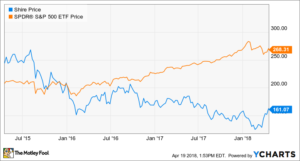Takeda Pharmaceutical Co. (NASDAQOTH: TKPYY) announced late last month its interest in making an offer to acquire Shire (NASDAQ: SHPG), and according to Shire, Takeda has followed through with three separate bids. So far, Shire’s board of directors has rejected the offers as inadequate, but that doesn’t mean another offer won’t convince them otherwise. It’s unclear if Takeda will make yet another bid, or when it might do so. But even if it doesn’t, a deal could still be struck.
On Thursday, Allergan (NYSE: AGN) reported that it’s considering making an offer to buy Shire, too. While it hasn’t said how much it’s willing to pay, the announcement starts a clock that requires it to make an offer or walk away by May 17, 2018.
What’s up for grabs
Only a few years ago, AbbVie tried to acquire Shire in a $54 billion deal, but that deal got the kibosh after Washington clamped down on tax inversions — mergers and acquisitions that shift companies’ headquarters to lower-tax countries (like Ireland) to cut their U.S. tax exposure.

Since then, Shire has expanded its position as a leader in rare diseases with a $32 billion acquisition of Baxalta. That deal landed it Baxalta’s top-selling hemophilia product lineup; as a result, Shire’s hematology drug sales were $3.8 billion in 2017.
Shire also has well-established immunology and neurosciences businesses that generate billions of dollars in annual revenue. Last year, immunology contributed $4.4 billion to sales, and neurosciences, which includes top-selling ADHD medications such as Vyvanse, added $2.7 billion to the top line. Products for internal medicine, including gastrointestinal drugs, added $1.7 billion to revenue last year, too.
An acquirer would also get its hands on Shire’s lineup of drugs for rare genetic diseases. Since rare-disease treatments often face little competition and command premium prices, they can be very profit-friendly. Last year, Shire’s rare-disease drug sales were $1.4 billion, thanks to demand for its enzyme-replacement drugs Elaprase, Replagal, and Vpriv.
Additionally, Shire has smaller segments in oncology, with $262 million in sales last year, and ophthalmics, which had $259 million in sales last year.
Overall, Shire markets over 40 products; in 2017, those products generated $14.4 billion in revenue, up 8% from 2016, excluding the Baxalta acquisition. That translated into adjusted earnings per share of $15.15, up 16% year over year. In 2018, Shire is guiding for mid-single-digit sales growth to between $14.9 billion and $15.3 billion, and because of price cuts due to generic competition, a slight decline in EPS to between $14.90 and $15.50. Longer term, Shire believes its sales could reach between $17 billion and $18 billion in 2020.
Why now?
Interest in Shire is heating up following the company’s decision earlier this year to restructure itself in a manner that could include spinning off its neuroscience business. A revamp, plus the fact that Shire significantly underperformed the market in 2017, may make this the perfect time to approach Shire’s board of directors with offers.

Acquiring Shire would bolster Takeda’s existing gastrointestinal and neuroscience businesses, and importantly, it would accelerate Takeda’s goal of pushing more deeply into the U.S. market. Last year, about 64% of Shire’s revenue came from the United States.
Takeda has said it wants to become a leader in oncology, gastroenterology, neuroscience, and vaccines by 2025; it already markets top drugs in those indications, including Entyvio for ulcerative colitis, Ninlaro for multiple myeloma, and Trintellix for major depression. Including Shire’s products in its existing lineup could go a long way toward delivering on its long-term strategy. It could also offer Takeda intriguing operating leverage and cross-selling opportunities within its core indications.
Getting a deal done for Shire could be tough, though. The companies are fairly equal in terms of revenue. And since Shire owes $19 billion in debt following its Baxalta acquisition, its enterprise value is approaching $70 billion, which is about $25 billion bigger than Takeda’s.
So far, Takeda has made Shire three unsuccessful offers. Its first was for about $58 billion and its third was for about $62 billion, at current exchange rates. Anything can happen, but it could be that Shire is too big a pill for Takeda to swallow, and Takeda ends up walking away.
If so, Shire might end up combining with Allergan instead. Allergan hasn’t made an offer yet, but it’s thinking about it. On Thursday, it reported it’s evaluating strategic moves that could include “divestitures, combinations and acquisitions,” and that it’s “hired multiple financial advisors to assist in the review of these options.” It also confirmed that it’s kicking around the idea of acquiring Shire.
Allergan’s best-known drug is Botox, but the company also markets gastrointestinal drugs, including Linzess; drugs for diseases of the central nervous system, including the schizophrenia medication Vraylar; and anti-infectives. Given those products, Shire would appear to complement Allergan nicely, too.
Getting a deal done with Allergan might not be any easier than it is with Takeda, though. Allergan’s revenue was about the same as Takeda’s last year, and while Allergan’s done a nice job pairing back its debt, it still owes $30 billion due to prior acquisitions.
What’s next
It’s anyone’s guess if Takeda makes a fourth offer or Allergan enters the fray. Shire has dispatched advisors to Takeda to discuss the potential for a deal. And based on U.K. rules, Allergan has 28 days to make a bid or walk away.
Overall, the amount of money necessary to close this deal has me watching Takeda and Allergan from the sidelines. Although I think Shire’s willing to talk, the fact that its previous deal fell apart does give me pause. If a deal doesn’t materialize, Shire’s shares could retreat significantly; for that reason, I don’t plan to buy shares in any of these three companies right now.


